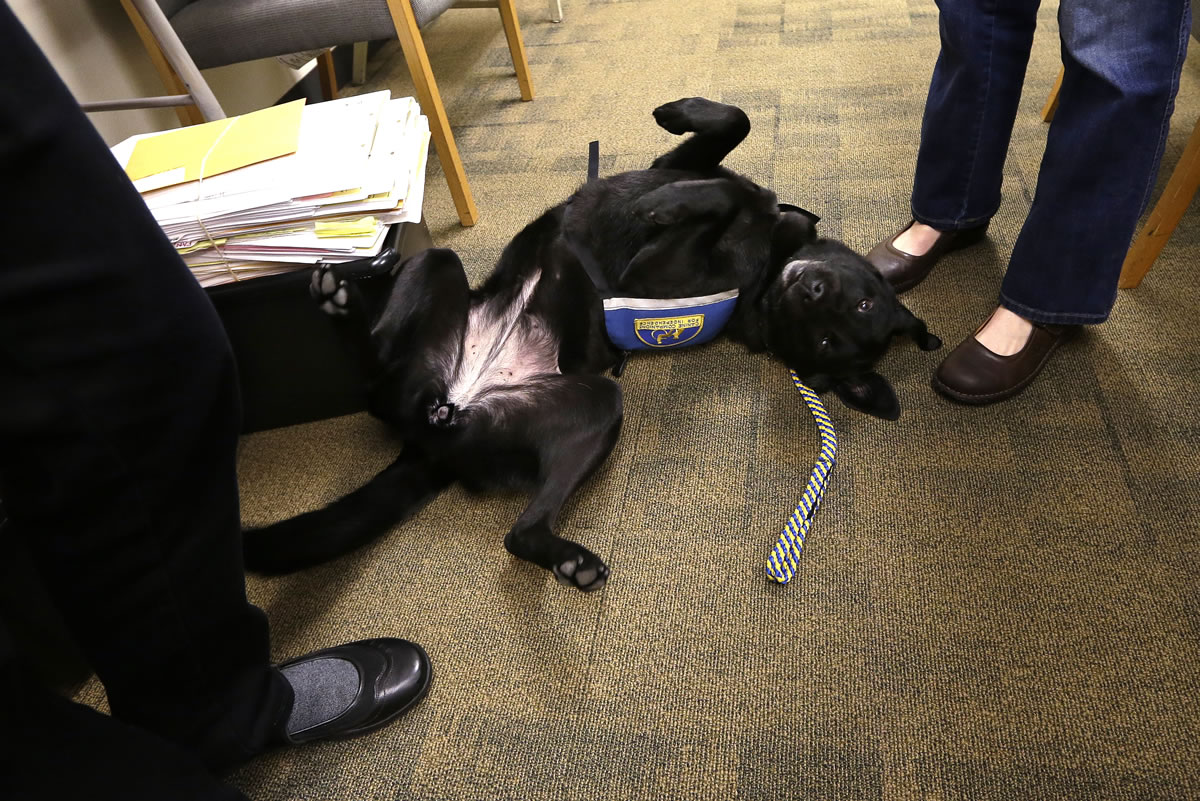LOS ANGELES — The twins were 7, shy and scared. Talking was tough and describing what happened nearly impossible.
So the prosecutor preparing them to testify against the father they said molested them borrowed a dog named Jeeter.
“It was a last-ditch effort to try to build rapport with my kids, who are terribly shy,” said Kelly Dempsey, the twins’ mother. “The prosecutor had no idea how to get through to them. … He just believed down to the depths of his soul the girls had been wronged and he wanted so badly to find justice for them.”
In Seattle 10 years ago, Jeeter became the first professionally trained dog to help a child testify, experts said. Dogs have been used with thousands of victims and witnesses since.
Today, there are 41 courthouse dogs working in 19 states and several more being considered, but some challenges are working their way through the courts, driven by attorneys who claim the dogs are distractions or sympathy magnets. So far, all lower courts have upheld the use of dogs.
In 2003, Jeeter was going to drug court once a week with King County deputy prosecutor Ellen O’Neill-Stephens. The rest of the week, Jeeter belonged to her son Sean, 21, who has cerebral palsy.
When her colleague asked to borrow Jeeter for the twins, the bonding was instant.
“Because of Jeeter and having him there, I don’t ever think about ‘Oh, it was scary walking in and seeing our dad after a while,'” said Erin, now a high school sophomore. “I don’t remember the bad, I only remember Jeeter. I think we escaped so much more normal than really we should have from such a bad situation because of Jeeter.”
Jeeter shadowed the girls. “I remember sitting in the chair. Between questions, he’d put his head in my lap and cuddle a little. One time (during a practice court session), he came into the room dressed as Zorro,” Erin said.
When there were questions about anatomy, the girls used Jeeter.
“A good dog provides decreased anxiety for any victim, be it a child, adult or elderly. If it gives them the opportunity to focus and find their voice, how is that bad?” Dempsey asked.
There were no objections to Jeeter in the twins’ case, and demand for a dog was so high that in 2004, the district attorney’s office got a full-time service dog, Ellie.
Jeeter and Ellie were trained by Canine Companions for Independence, headquartered in Santa Rosa, north of San Francisco.
CCI has trained about 230 “facility dogs,” including courthouse dogs and those working at burn centers, hospices or schools. The dogs are mostly Labrador or golden retrievers or mixes, said Jeanine Konopelski, CCI’s national director of marketing.
Five years ago, O’Neill-Stephens was so sure that victims and witnesses would benefit from a good dog in court that she founded Courthouse Dogs Foundation in honor of her son. She retired in 2011 to devote all her time to it.
O’Neill-Stephens and Courthouse Dogs Foundation Executive Director Celeste Walsen are also helping set up programs in Canada, Chile and Finland, and to standardize the training for courthouse dogs.
The next challenge to the dogs was scheduled in Washington state’s Supreme Court.
The case involves a man convicted of burglarizing a Seattle apartment in 2008. Because the victim had the mental skills of a child, he was allowed to use Ellie when he testified.
An appeals court upheld the use of the dog, so attorney Jan Trasen with the Washington Appellate Project took the case to the higher court.
Trasen contends there is no precedent for using a dog in court. The state says it’s covered by a law that allows vulnerable witnesses to hold a Teddy bear or doll.
Trasen said you can’t compare the two, because “those items are all inanimate objects. They don’t move. They don’t look you in the eye. They don’t respond to the human voice. … I have a dog, I love dogs. It’s actually for that very reason, I know how well people respond to them.”
A ruling is pending in a similar case argued before an appellate court in New York.



